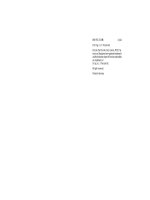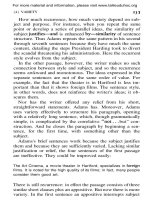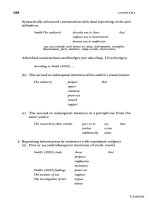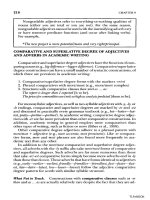Tài liệu Teaching economics to MBA Students pdf
Bạn đang xem bản rút gọn của tài liệu. Xem và tải ngay bản đầy đủ của tài liệu tại đây (114.22 KB, 10 trang )
Kho luận văn kinh tế đồ sộ
Download hàng trăm ebooks kinh tế Page 1
Peter Swann
Manchester Business School, University of Manchester
Published August 2002
Introduction
The Economics LTSN invited me to write a case study discussing the challenges and
rewards of teaching economics to MBA (Master of Business Administration) students.
Why a case study about MBA teaching? Certainly, it is an important market and has
grown rapidly. More to the point, teaching MBA students poses particular challenges,
but equally can be exceptionally rewarding.
A natural place to start is with some of the myths about teaching MBA students. It is
said that that MBA students do not want to learn about economics, and especially not
micro! More generally, it is said that they don't like the tough subjects like
economics and statistics, but prefer the more approachable subjects such as
marketing and strategy. It is said that they haven't the patience for intellectual
rigour, but want everything distilled to a few bullet points. Finally, it is said that they
are not much concerned about the research prowess of their teachers, or even their
institution. If they have any view about research, it is said that they see research as
something that so preoccupies their tutors, that these do not pay enough attention
to their teaching.
I believe that all of these are myths. Contrary to the myths, many MBA students can
be persuaded of the huge value of studying economics (macro and micro). Some of
them prefer economics to the "softer" subjects, in part because economics is
rigorous. Many of them consider that the presentation which contains "bullet points",
but not much else, is an insult to their intelligence. Many of them care a lot about
their institution's reputation, and the research reputation is an important part of
that. Moreover, they like it a lot when you can illustrate an MBA lecture by referring
to research you have done on the topic - and especially if that research has had an
impact on a business or policy audience.
However, the reader should be careful not to conclude from the above that teaching
economics to MBA students is really just like teaching economics students. It
certainly is not. Teaching MBA students brings many tough challenges, and there is a
steep learning curve. A proportion of excellent undergraduate teachers, and perhaps
an even higher proportion of excellent MSc and PhD teachers, has not been able to
make the transition to teaching MBA students. However, the transition is possible,
and I hope this note will help those making the transition to understand some of the
Kho luận văn kinh tế đồ sộ
Download hàng trăm ebooks kinh tế Page 2
real challenges, and not to be deterred by the myths. Experienced MBA teachers,
however, will find little here that they do not know already.
In what follows, there is a lot about the difficulties and challenges of MBA teaching.
But equally, I want to stress some of the reasons why teaching MBA students can be
as enjoyable as any other type of university teaching - and in some ways more so.
The Learning Curve
There is no doubt that the learning curve in teaching economics to MBA students is a
steep one. One of the best ways to make progress is to teach in parallel with an
excellent teacher. I was very fortunate in that regard. My first experience of teaching
MBA students was a decade ago, when I taught one cohort of a core economics
course at London Business School, with Paul Geroski teaching another. That was a
tough act to follow, because Geroski was (and is) one of the most outstanding MBA
teachers anywhere. Even though he shared a lot of teaching materials and advice, I
could not begin to live up to his high standards, and those students assigned to my
cohort rather than Geroski's felt hard done by. While it may not have been apparent
to me at the time, I was learning a lot from the experience.
Another key to making progress along the learning curve is learning from the
feedback given by MBA students. Some of this feedback can be pretty discouraging.
MBA students certainly do not mince their words! It is said that at least one business
school employs a psychotherapist to help shell-shocked academics cope with the
trauma of feedback from MBA students! But while some of the feedback is tough,
and occasionally it is just plain rude, there is no doubt that the much of the criticism
flags real weaknesses. If you can try to cope with it positively, and change what you
do to meet some of the criticisms, then things will improve.
My impression is that the propensity of MBA students to complain is highly nonlinear.
They will happily put up with a few shortcomings and small mistakes, and make little
of these. But when problems cross what I shall call a "good will threshold", then the
floodgates open, and some students start to criticise everything. You are criticised
for not allowing enough class discussion one week, but too much discussion the
next; for choosing one industry rather than another in your case studies; for not
using enough slides, or using too many slides; for speaking too slowly, or speaking
too fast; for your choice of tie! Some of this is nonsense and should be ignored.
Some of it may reflect weaknesses that you can do nothing about. But I believe one
should try to respond to the rest. The aim is not zero defects: that would be
impossible. But the aim is to keep safely below the "good will threshold" described
Kho luận văn kinh tế đồ sộ
Download hàng trăm ebooks kinh tế Page 3
above. Then MBA students will put up with a few idiosyncrasies and mistakes, and
are happy to say you are doing a good job.
The MBA Student
On reading the above, some may be thinking, "why are MBA students so
demanding?" and, perhaps, "should we put up with all this, or should we not teach
them to be a bit less critical?" To answer these questions, we need to understand a
bit more about the MBA student.
One has to accept that MBA students see themselves as customers, even if some
academics are uncomfortable with that label. They pay high fees, and they are very
sensitive to the high opportunity cost of their time. (Indeed, opportunity cost is one
of the micro topics that MBA students learn very quickly, and remember!) They feel
entitled to expect very high standards, and entitled to get angry when standards
drop. But as a corollary - and this is one of the real rewards of working with MBA
students - they are highly motivated and expect to work hard.
MBA students, like any other students, vary greatly, so one should be careful to
avoid stereotypes. They are often portrayed as very career driven, very market
oriented, and not very idealistic, but in my opinion many do not fit this stereotype. It
is true that electives on mergers and acquisitions, strategy, options, advertising and
marketing tend to pull in more students than electives on business ethics or
environmental issues. But equally, I have been impressed by how many of them are
highly critical of cynical business practice, and do not want to see themselves
developing in that way.
While MBA students have often been very successful before they take the MBA,
others have chosen to take the course because their career is not progressing in the
way they want. Indeed, they are not taking the MBAbecause they fit the stereotype
of the last paragraph, but rather because they do not. People who already fit that
stereotype arguably don't want and don't need to come to business school.
The diversity is one of the very rewarding things about teaching MBA students.
Collectively, they have a breadth of knowledge and experience that you won't find in
many other classes. Many different disciplinary backgrounds are found in an MBA
class. Also, of course, full-time. MBA classes tend to be highly international. The
beauty of this is that if you pick an example from a particular industry to illustrate a
point, the chances are that at least one student will have experience of working in
that industry, or experience as a customer of companies in that industry. Moreover,
Kho luận văn kinh tế đồ sộ
Download hàng trăm ebooks kinh tế Page 4
they will want to share that experience with the class. Already you have something
to draw on which would be rare with many other students. Moreover, they generally
show a very high degree of motivation. If you can make the most of their diverse
experience, determination and motivation, then you should be able to create a great
learning experience.
However, this diversity also brings some further challenges. It is difficult for an MBA
teacher to be all things to all people. For one thing, experience in economics varies
widely. I ask each class in the first lecture how students would categorise
themselves:
(a) have studied some economics formally at school and/or university
(b) have not studied economics formally, but read economics articles in
the Economist, Financial Times, etc.
(c) would answer "no" to (a) and (b)
The class often divides about one third (a), one third (b) and one third (c). Almost
inevitably, therefore, MBA courses in economics are limited to a basic introduction.
This is OK for (b) and (c), but can be frustrating for (a).
For another thing, I doubt that there is a single teaching style that is ideal for all the
many types of MBA students. Some like "dynamic" presentations with slick repartee,
while others see the professor as a "sage". Furthermore, mathematical ability varies
very widely. Those with a background in the arts tend to be thrown by mathematical
models in an economics course, so these have to be used with caution. But the MBA
class may also include students with a PhD in physics who long for a more
mathematical treatment of economics.
Attention to Small Details
My view is that for most teachers, an essential component of success with MBA
students is attention to small details. That may seem surprising, but the justification
for my assertion comes in the non-linearity of the student complaint function, as
described above. If you pay attention to all the small details, then students will
forgive the odd lapse or a less than enthralling style, because you are still within the
"good will threshold". But if you do not pay attention to the small details, then they
will not be so forgiving of other mistakes. Only those who can win over the students
with sheer style or charisma can afford to take chances with the small details.
Kho luận văn kinh tế đồ sộ
Download hàng trăm ebooks kinh tế Page 5
So what are the simple things that need to be right? I shall list five. First, MBA
teaching requires painstaking preparation. Students want all the slides, cases, web
references, readings, assignment details, past exam papers - everything, indeed - in
advance. We put all this material in a coursebook handed out in lecture 1. It may not
seem like a big deal, and indeed it isn't, really, but it does make an extraordinarily
big difference. One MBA student put this very succinctly on the feedback form:
"Course handouts + workbook + preparedness = excellent!"
Second, don't "teach to the textbook" - unless, of course, it is a text you have
written yourself. My experience is that MBAs do not like it at all when faculty teach
straight from a text. The reason is clear enough. The MBAs expect, as an absolute
minimum, that faculty will bring their own experience and expertise to the
classroom. This way they know they are getting something that is unique, and which
they would not get anywhere else. To mimic a textbook is to add no value at all.
Of course, those who produce all their own material but use a textbook as a backup
may sometimes say things that contradict what is in the textbook. MBA students, like
any others, prefer not to encounter such contradictions. But this is a much lesser sin
than mimicking the text.
The third detail is topicality. I remember once being gently mocked by a friend from
the City of London when he found me reading a Financial Times from the previous
week. For him, of course, there could be no market relevant information
in yesterday's FT - let alone one that was a week old. The life cycle for materials
used with MBA students is not quite so short. But a useful rule of thumb is that last
year's case may now be out of date. Even if an old case illustrates your point
perfectly, it is generally interpreted as a bad signal to leave old material in a
coursebook. Having said that, MBA students can be surprisingly ambivalent about
references to recent materials on the web. They like the "up to the minute" flavour
which web references seem to imply, but MBA students still seem to work, primarily,
in a paper culture.
The fourth detail concerns intellectual modesty. Some may be surprised to read this,
believing that neither teacher nor student is likely to be intellectually modest in the
MBA classroom. But my point is a little different.
MBA students, as we have seen, come from a diverse range of backgrounds. Those
with a background in the hard sciences don't tend to be too impressed with any of
the social sciences, not even economics. And those with a business background often
Kho luận văn kinh tế đồ sộ
Download hàng trăm ebooks kinh tế Page 6
argue that, to paraphrase, "the real world is not like your simple economic models".
As a result, the MBA teacher should be very cautious about claiming too much for
economic theory in this audience. In particular, it is very hazardous to make any
statements like, "economic theory shows this must happen", or, "economic theory
shows that can't happen". For example, if the MBA student points to a particular
economic phenomenon and is met with a response from the tutor, "economic theory
shows that cannot happen", then an audience of this sort can react very badly. I am
reminded of Dr Johnson's angry response on hearing Bishop Berkeley's theory of the
non-existence of matter. Kicking out at a stone, he shouted, "I refute it thus!"
The fifth and final point on my list of "small matters" concerns how you deal with
student enquiries. Although, once again, it may seem a small point, it is hard to
overestimate how much this matters to MBA students.
Let us focus on enquiries in class. MBA teaching must be more interactive than most
other types of teaching. MBA students expect to have the opportunity to interact
with lecturers, and with each other, in class. It has a pedagogic role, of course, but is
even more important as a signal that you are responsive to their views and
questions.
Some MBA students say in their feedback that lecturers should be much tougher on
those who ask stupid questions or give stupid answers. This will always be a matter
of personal style and preference, but my view is that such toughness can be
dangerous. It is well known that Keynes' practice was to be rather gentle with
students when they made foolish remarks, even if he was quite intolerant of stupidity
from his colleagues. I believe that is a very sound strategy for dealing with MBA
students, at any rate.
MBA students tend to be hugely impressed if you remember questions raised in one
session and then come back a few lectures later and say, "as that student said in
lecture 2." Does this sort of thing really matter? Yes, I think it does. It is all a part of
the strategy of keeping within the "good will threshold". If you can do that, then you
have a far better chance of persuading them to engage with your subject matter.
Economics within the MBA Curriculum
There is a perception in many business schools that MBA students do not want to
learn about economics, and especially not micro! Sometimes this perception
originates with colleagues in other fields and disciplines, rather than with the
students themselves. It is true that MBA students are usually cautious at the start,
Kho luận văn kinh tế đồ sộ
Download hàng trăm ebooks kinh tế Page 7
and wonder why they are expected to study economics on top of everything else. A
key part of the economist's strategy must be to show them very early on how
economic concepts provide powerful tools to understand everyday business issues.
While some MBA students will never be persuaded, I think that it should almost
always be possible to overcome the initial skepticism in the class.
Moreover, several MBA students have told me that they appreciate the substance -
and even the rigour - which is missing on some other courses on the MBA. The key
here is to make the rigour work for you and not against you, and there is a very
fundamental asymmetry in how the MBA student perceives rigour. When rigour is
combined with relevance, that enhances the attraction of economics over some other
fields and disciplines. But when rigour seems to be combined with irrelevance, then
that just makes things worse. This relates to my earlier point about intellectual
modesty. In short, rigour enhances relevance but exacerbates irrelevance.
A good strategy in teaching economics to MBA students is to show them that
economics underpins many of the other fields on the curriculum - such as strategy,
marketing, finance, etc. In general this is something that we must do ourselves,
because our colleagues in other fields are unlikely to make the point on our behalf.
But to do this requires that one knows some marketing and strategy (and other
fields), and is familiar with some of their key references. It is difficult to overstate
the importance of this. MBA students sometimes wonder why they are expected to
cover so many different fields when many of their teachers are only familiar with one
field. There are high dividends to be gained from showing the class some of the
linkages between fields and disciplines. Last year, one student said to me after
studying economics and several related fields, "now I see economics in everything."
It is easier to show these linkages in a convincing manner if you maintain a good
dialogue with cognate disciplines and fields - and this has some implications about
the sorts of economists who may flourish in business schools, which we return to at
the end.
It is generally easier to convince our colleagues in other fields and disciplines of the
relevance of macroeconomics than of microeconomics. I think a majority of students
also find it easier to relate to macro. They refer to the fact that macroeconomics is to
be found on the front page of the newspaper. But that gives us an indispensable
clue. Choose micro case studies from the front pages, and students are quickly
persuaded of its importance. This illustrates a more general point. Economics works
best with MBA students if they can very quickly see ways in which to apply economic
tools to practical business questions. A good strategy is to pick examples where
students have interest and/or experience. For example, most MBA students have a
Kho luận văn kinh tế đồ sộ
Download hàng trăm ebooks kinh tế Page 8
good knowledge of air travel and the mobile phone market, and those two alone
allow us to illustrate quite a few economic phenomena.
MBA Teaching and Research
In some business schools, there is - or perhaps was - a widespread view that we can
find a negative correlation between research ability and the ability to teach MBA
students. This could be interpreted in at least three ways. First, maybe the MBA
student does not value research. Second, maybe the personal characteristics
required to be an excellent MBA teacher are different from those required to be an
excellent researcher. Third, maybe the most active researchers are so preoccupied
with their research that the quality of their teaching suffers as a result.
I said at the start that I think the first of these is a myth, and the aim of this section
is to comment on a virtuous circle between teaching and research. However, let me
first comment briefly on the second and third hypotheses.
Concerning the second hypothesis, some writers on creativity have indicated that the
very best researchers are more likely to be introverted than extroverted. By
contrast, the highly interactive style of MBA teaching means that the best MBA
teachers cannot be reclusive. So there is perhaps some loose justification to be
found for the second hypothesis.
Concerning the third hypothesis, to the extent that all are operating on a time-
budget constraint, then an extra hour spent in research must mean an hour less for
something else (maybe teaching preparation). In that sense, there is some sort of
trade off at work here - though it does not apply exclusively to the business school.
However, my opinion is that the virtuous circle between research and teaching
probably offsets these two latter effects. First, as commented already, it is a myth to
say that MBA students don't care about research. This underestimates the MBA
student as a customer. This is a customer who places a high value on distinction, and
if research can deliver distinction then it is of value. This may come at a general
reputational level. MBA students like to go to the most prestigious schools, and if
research enhances that reputation then it is valuable to the student - even if it
delivers no pedagogic benefits.
More important, however, I think there is a more direct effect at work here. As I
have said already, MBA students like to feel they are getting something on their
programme that they could not get anywhere else. In my experience, MBA students
Kho luận văn kinh tế đồ sộ
Download hàng trăm ebooks kinh tế Page 9
are always eager to probe the lecturer to find out how much he or she knows. MBA
students appreciate it greatly when they are taught by someone who not only knows
his or her field, but also is actively engaged in research, which further develops the
field. MBA students are as quick to praise the lecturer for scholarship and the ability
to use it in class, as they are to complain about shortcomings.
Research projects generate distinctive insights and evidence. MBA students
appreciate the lecturer who can make 'off the cuff' reference to these, especially in
response to student questions in class. It helps when projects are commissioned by
international organisations, government departments or companies, because this
persuades students that economic principles can be put to very practical use.
Moreover, active researchers will have research associates who are a very useful
resource for students. This is most obvious in project work, where these researchers
provide additional expertise.
To complete the virtuous circle, it is actually quite important that some teaching
experiences feed into research. It matters to MBA students that this should happen.
In a session on perfect competition a couple of years ago, one of the MBA students
argued that, "the Internet will lead to perfect competition." This struck me as a very
interesting observation, though possibly wrong, and it is a theme on which I have
subsequently written.
On balance, therefore, I suspect that the plusses from research at least balance the
minuses.
Being an Economist within a Business School
I conclude with two observations about being an economist in a business school.
First, some have suggested that a non-orthodox economist will fit more comfortably
into a business school than a mainstream economist. There may be something in
this. To take one example, I said above that a good strategy for teaching economics
to MBA students is to show how it underpins other fields such as strategy and
marketing. Many business school economists see an incentive to spend time
developing linkages to these adjacent fields, while those in the mainstream do this
less often.
Second, some have suggested that teaching MBA students compromises your
thinking as an economist. I suppose it is formally impossible for a business school
economist to answer this assertion. I am reminded of the well-known philosophical
puzzle about the tribe whose members are all thought to be liars. The puzzle notes
Kho luận văn kinh tế đồ sộ
Download hàng trăm ebooks kinh tế Page 10
that if you ask a member of the tribe, "are you a liar?", you will get the answer,
"no", but that neither refutes nor confirms the conjecture.
Nevertheless, my view is, "no", teaching MBA students need not compromise one's
thinking as an economist, though it probably does alter one's research and teaching
priorities. One leading UK business school academic argued in a recent lecture that
when economists join business schools they no longer preach against monopoly, but
instead teach strategies for achieving monopoly. I do not recognise that in my
experience of business schools. And moreover, such an argument underestimates
the MBA student. I have heard too many of them complain about the ravages of
monopoly to sustain any impression that they simply want to learn the necessary
tools to turn themselves into monopolists.
Notes
1. Peter Swann () is Professor of Economics and
Management of Innovation at Manchester Business School. He was awarded a
commendation in the 2001 Economics LTSN Annual Teaching and Learning Awards.
Earlier in 2001, he won the first A. T. Kearney Award for Teaching Excellence at
Manchester Business School, for his MBA course on microeconomics. This is given to
the member of faculty voted as "best teacher" by graduating MBA Students.
2. Part-time MBA classes tend to be much less international. There are indeed some
interesting differences between teaching full time MBA students and part-time MBAs,
but there is not space to go into that here.
3. This is a good strategy when, as usually happens, core courses such as economics
are scheduled towards the beginning of the MBA programme.
4. Many believe that research performance is more likely to have a positive
correlation with performance in teaching specialist masters or PhD students.
Moreover, it seems clear that the skills required to be an excellent MBA teacher are
somewhat different from those required in other areas. Some excellent
undergraduate, specialist masters and doctoral teachers are not good MBA teachers,
and vice versa. Also, and perhaps surprisingly, some excellent MBA teachers are not
good executive teachers, and vice versa.









